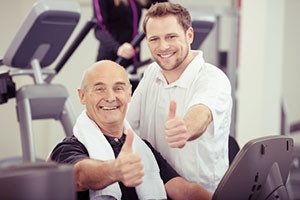 As people grow older they tend to exercise less. Sometimes this is due to injuries, or chronic aliments, other times it is simply something that falls off as people age. For caregivers it is important to discuss exercise options with a client, and help them find ways to stay fit and active. Exercising properly will increase the overall well being of the client, and can help them achieve a better standard of living.
As people grow older they tend to exercise less. Sometimes this is due to injuries, or chronic aliments, other times it is simply something that falls off as people age. For caregivers it is important to discuss exercise options with a client, and help them find ways to stay fit and active. Exercising properly will increase the overall well being of the client, and can help them achieve a better standard of living.
Caregivers should discuss with their clients, the types of exercises that should be done. Most days it is recommended that a senior get at least 30 minutes of cardiovascular exercise. Some good examples are swimming, walking, and cycling. The caregiver should always take their clients current physical fitness into account when attempting to set up a work out schedule.
Strength training is recommended for two days a week. There are several strength training exercises that seniors can do, such as wall push ups, chair squats, and bicep curls. A caregiver can help determine which exercises are best, and how often then should be done.
As a home care worker, always make sure that the client is wearing loose, well-fitting, and comfortable clothing. Good shoes with arch supports, and cushions, to absorb shock, are also recommended for seniors when they work out. A caregiver should make sure the client is in good enough health for exercise, as working out with a cold, or flu can be detrimental to health. Before working out the client should always warm up, and stretch both before, and after the exercise period.
The caregiver should be alert for dangerous symptoms that may appear while their client is exercising. Chest pains may be a warning that a cardiologist appointment should be set. Dizziness, trouble breathing, trouble balancing, and nausea may also be warning signs of over work, or underlying medical conditions that need to be addressed.
A caregivers primary goal is to make life as long, and enjoyable as possible for their clients. Helping the client exercise to the best of their ability, and monitoring their progress can help serve that goal. This is just one of the many ways that home care can help our elderly loved ones.
